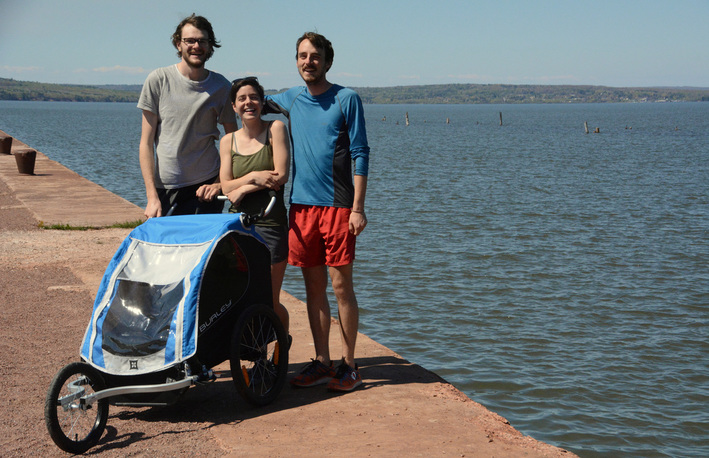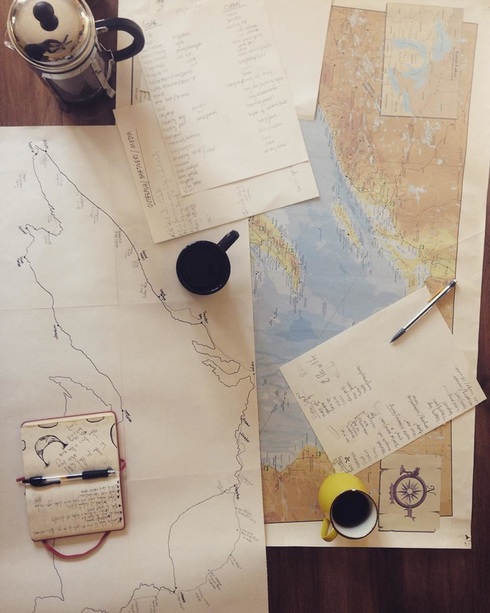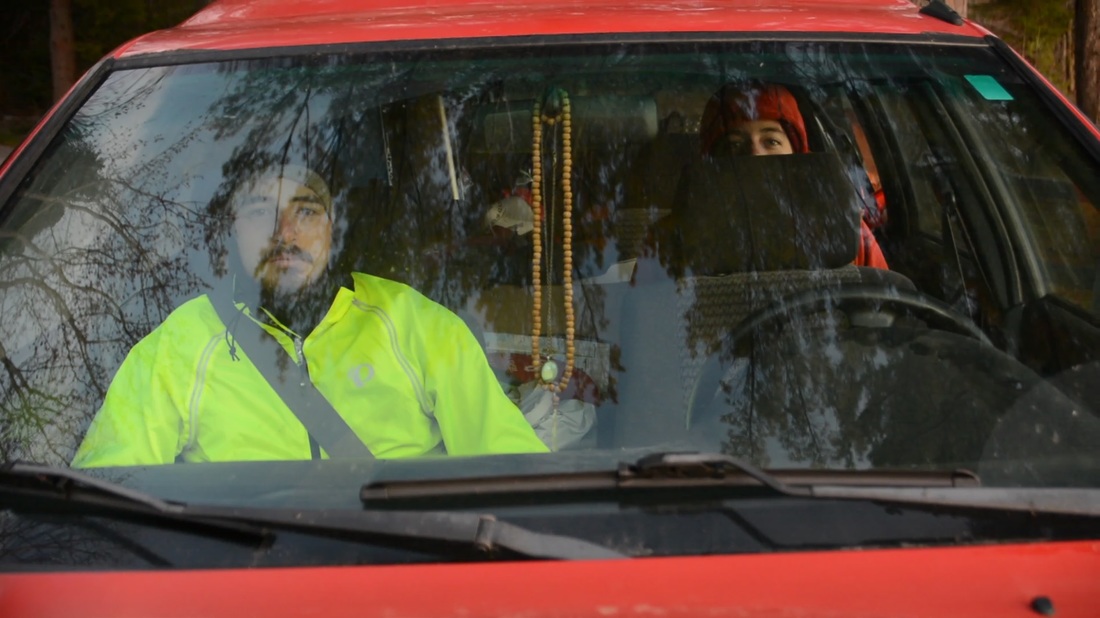By: Our Shores
Microplastics Adventure Scientists
Microplastics Adventure Scientists
Something we feel is important to talk about is how we’re carrying ourselves around the lake. We are very intentionally choosing a method of travel that will require us to take every single step around the lake. We are running. For three months…with a baby stroller containing all of our food and equipment. We could drive. That would surely be easier on our bodies and require less planning. We could bike, which is tough in its own right, but we felt the wheels would be doing too much of the work. Those modes of travel would accomplish the same task of starting at point A and getting to point B, but we are running (and let’s be honest, sometimes walking). There was something that felt so right about making this decision precisely because it afforded us an experience we would not get otherwise. To accomplish our task we have to trust our bodies. Our bodies with their ligaments and bones and joints that are all too fallible and breakable. With our muscles that could get fatigued and fat stores that could become depleted. It sounds like something could go wrong. To be truthful it sounds painful. So why? Why? Good question.
We can’t answer that fully but we do know that we are aware of what this expedition might mean for our bodies. And I think the fact of the matter is we want what will come. We want the difficulty and the struggle. We want to test our limits in a way we haven’t tested them before. We value exploring these limits and what they may teach us, not just physically, but mentally, emotionally, and spiritually. With something as important at stake as the health and well-being of the lake, we only think our work is a fair price for knowing it more fully and completely in all its moods and impressions. Once we realized that, we began to realize there was an unsaid word hanging between all three of us: pilgrimage. We don’t use the word pilgrimage to self-aggrandize but we are also taking it seriously and mean to hold it close to us as we run. Paulo Coelho, author of books such as The Alchemist and The Pilgrimage, said it best: “We have this possibility of doing a pilgrimage every single day. Because a pilgrimage implies in meeting different people, in talking to strangers, in paying attention to the omens, and basically being open to life. And, we leave our home to go to work, to go to school, and we have every single day this possibility, this chance of discovering something new.” Deep down, that is our earnest hope: to discover. We are circumnavigating the world’s largest freshwater lake with our thoughts and intentions bent toward it the whole time. Almost every day we’ll wake up right next to it. All day we’ll struggle alongside it and at night we’ll fall asleep to the sound of it crawling along the shore.
This project is intensely personal and we hope to explore those depths within ourselves. But we also hope to shine a light on things we think are bigger than us. In that sense we are using this run to focus people’s attention on critical issues facing the lake. After a round of initial research, we found the body of work that University of Wisconsin Superior professor Lorena Rios Mendoza has put forward. She has dedicated her research to the issue of microplastic pollution in both the oceans and the Great Lakes watershed. Her results on the extent of microplastic pollution in the Great Lakes were particularly unsettling. We decided this would be our access point: to bring awareness to the creeping threat of plastic in the world’s largest body of freshwater. The next big hurdle was figuring out how. How could we effectively contribute to the knowledge base that already exists? How could we help bring awareness to this issue while pushing a baby stroller for 1,300 miles, often far from the internet or any post office? Lucky for us a dear friend quickly pointed us to Adventure Scientists. By joining the Global Microplastics Initiative we could not only bring local awareness to a regional problem facing Lake Superior, but could contribute our own water samples to a global data set. We’ve found this often happens when you work with water. When you touch what is incredibly close and personal, you also touch that which is global and universal.
Running around the lake is our primary goal and to accomplish that required an immense amount of planning. Since we first decided to run around the lake a year and a half ago, we’ve had to deliberately shape our lives around making this project come to life. Like many post-college graduates navigating the world, our lives during this time have been filled with new challenges. Planning and preparing for this journey has added another layer of deep intention to our everyday lives. We have a very real (and impending) start date and a myriad of tasks to do beforehand. We have a clear budget and a fundraising goal. We know how many miles we have to run and how many days it should take. Our lives are filled with quantifiable numbers. Besides all these knowns, however, there has also been a sense of the nebulous unknown. From the onset of our planning, the year and a half in front of us felt so fragile. How could all this actually come to fruition? What if we snapped an ankle on a casual training run? What if modern civilization curled up, coughed its last gasp and left the Midwest amidst a battle of warring feudal states? What if one of us decided we just, like…didn’t want to do it?
In fact, some of our fears have come to pass. We were originally a group of five. Now we are three. Evan fractured his foot. Andy split open his leg with an errant ax. Allissa has been researching and writing a Master’s thesis. Wounds heal, deadlines pass, and we still lace up our shoes to get in the day’s miles. What has become readily apparent throughout the course of our planning is that your body and mind are rarely at one-hundred percent.
No matter how prepared we are, our start date will come and we will run. And run, and then run some more. We are setting ourselves into orbit around the lake to come back to where we started, compare notes about who we were, and see what’s different. We’re taking our time and energy and laying it on the sacrificial altar of the lake in hopes we hear something back. There is something immensely powerful pulling us inward. Something that we hope the arduous and ascetic act of running around the object of our shared love will satisfy. Will it? Who knows! But we’re ready to find out. One thing that has become clear as we prepare for our journey is that we’re not looking for answers, we’re looking for questions.
Follow the trio’s journey around the Lake at ourshoresrun.org. Learn more about the Global Microplastics Initiative and other ASC projects on our website, the Field Notes blog, and our Facebook, Twitter, Instagram and Google+ pages.




